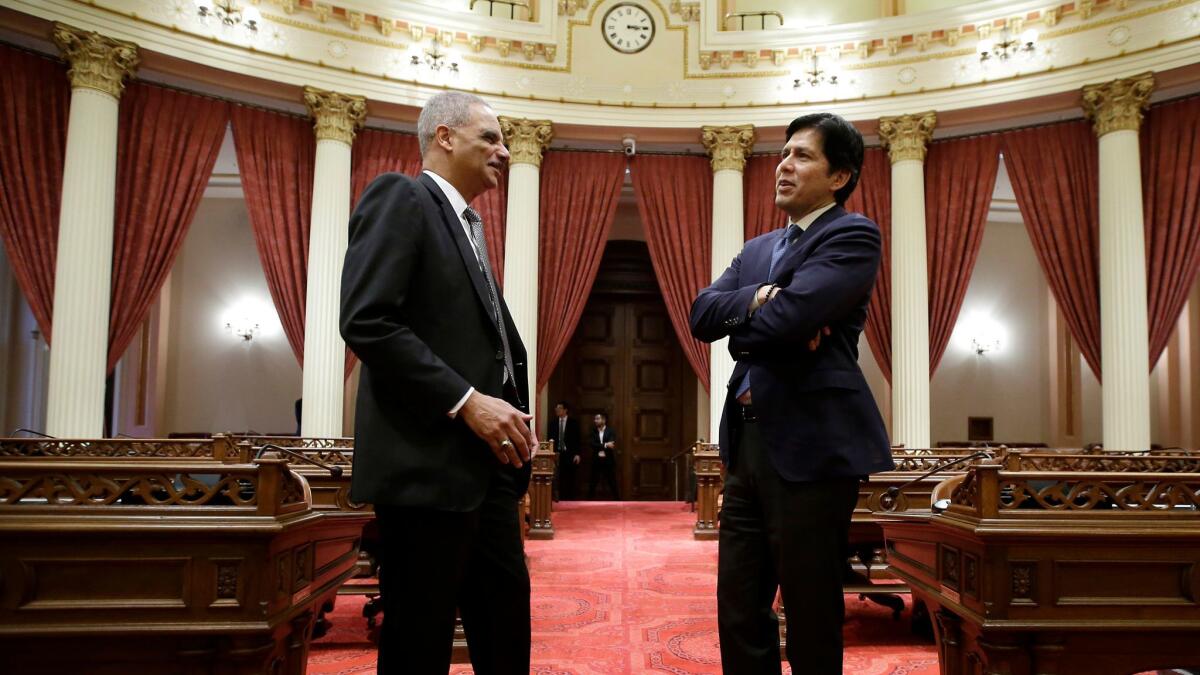Editorial: Don’t fulfill Trump’s false depiction of California as a ‘sanctuary state’ for undocumented immigrants

- Share via
President Trump has branded a California bill to restrict the role of state and local officials in deportations “ridiculous” — which, given the current state of affairs, gives the proposed legislation instant credibility. It is Trump’s sweeping deportation threats that are ridiculous and dangerous, and that make proposals like Senate President Pro Tem Kevin de León’s SB 54 a part of the state’s arsenal to protect its residents and its economy. But as the bill’s details are being worked through, de León and his colleagues must take care not to turn California into the obstructionist jurisdiction that Trump and anti-immigration activists have falsely claimed it to be.
Lawmakers are rightfully worried about Trump’s pronouncements on illegal immigration. After first pledging to deport all immigrants in the country illegally, then only violent criminals, he has broadened his deportation target again to include those who are merely accused by police of minor crimes, or who claim a public benefit such as a free school lunch. And he continues to stain immigrants as violent criminals despite studies that show immigrants, both with and without legal status, commit crimes at lower rates than native-born Americans.
Much of his rhetoric is drawn from immigration opponents who have long criticized what they falsely claim to be local policies to harbor people who are in the country illegally and keep them from federal immigration agents.
If not worded with care, the bill could make the inaccurate characterization of California cities as obstructionist seem credible.
But most of California’s so-called “sanctuary cities,” including Los Angeles, are nothing of the sort. Rather, these jurisdictions rightly recognize that local resources should not be spent enforcing federal immigration laws. Doing so wouldn’t just blur the lines of enforcement responsibility; if immigrants view local police as immigration agents, they are less likely to report crimes or cooperate in investigations. That is a danger to communities. But cities and local law enforcement agencies routinely work cooperatively with U.S. Immigration and Customs Enforcement. The common assertion that local police and sheriff departments block the feds from obtaining information about people they arrest and jail is simply false.
California’s leaders could easily stand up to Trump’s baseless assertions by restating the obvious and verifiable fact that neither the state nor any jurisdiction in it actively interferes with federal law enforcement.
De León’s proposed legislation takes a different route: It would for the first time impose on Los Angeles and other cities, as well as counties, school districts and health facilities, a directive not to cooperate with immigration authorities. The directive would apply to law enforcement, health facilities and schools across the state.
If not worded with care, the bill could make the inaccurate characterization of California cities as obstructionist seem credible. It wouldn’t make California a “sanctuary state” — but it could layer on requirements that prevent local police agencies from using their own experience and discretion in choosing how best to protect public safety.
To de León’s credit, he is working with law enforcement to ensure that the bill would not restrict the ability of police to work with federal officials on human trafficking, border protection, and apprehension and prosecution of violent and dangerous criminals, regardless of their immigration status.
But in its current form the bill would keep ICE agents from interviewing people held in local jails. That might seem like an overstep — why not let immigration officers talk to people in custody? — were it not for ICE agents’ past abuses in racially profiling inmates. Nevertheless, it would be better to limit ICE’s access to individuals that the agency has identified as possibly living here illegally, rather than imposing a blanket denial of access. The bill also would bar local officials from responding to requests for information, such as an inmate’s release date or home address. But there is no good reason for local police not to answer specific requests about individuals in custody.
California’s local law enforcement agencies should not be conscripted, against their will, by federal agents into rounding up people for deportation, especially when they have their hands full with violent crime. Neither should they be prevented by Sacramento from working with immigration officials when they believe it will help keep their cities safe — for example, by prosecuting and punishing violent criminals, rather than simply escorting them across the border so they can return a week later.
It’s a delicate line to walk. Resisting Trump’s ridiculous deportation plans and his inaccurate depiction of “sanctuary cities” is crucial. The guiding principle here should be that immigration authorities do their jobs, and local agencies do theirs without actively shielding people or otherwise crossing the line from principled silence to obstruction.
Follow the Opinion section on Twitter @latimesopinion and Facebook
More to Read
A cure for the common opinion
Get thought-provoking perspectives with our weekly newsletter.
You may occasionally receive promotional content from the Los Angeles Times.










